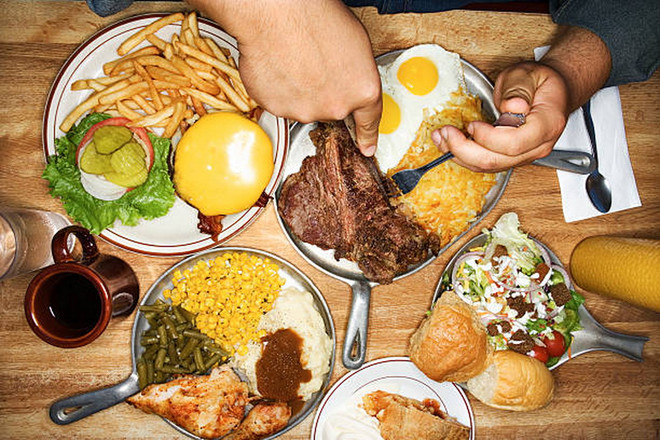 |
| (Photo: Getty Images) |
The idea that "you shouldn't eat after 7pm if you don't want to gain weight" is often seen as a familiar piece of advice in the beauty and weight loss community.
But is this actually based on science , or is it just an unfounded myth?
To answer this question, we need to look at it from many different perspectives, including biological factors, the body's natural circadian rhythms, total calorie intake, nutritional quality, personal lifestyle habits, and even daily eating behavior.
1. Weight gain mechanism
Weight gain, when analyzed from a physiological perspective, is the result of an energy surplus. This means that the amount of calories taken into the body exceeds the amount of calories burned through daily activities and movement.
The timing of meals does not play a key role in determining weight gain. Instead, the most important factor is the total amount of calories consumed throughout the day.
Even if you consume food after 7pm, but the total daily calorie intake is still maintained at the required level or lower than the body's energy needs, weight gain will not occur. On the contrary, even if you only eat before 7pm, if the accumulated calorie intake exceeds the body's needs, weight gain will still occur.
Therefore, meal timing cannot be considered the main factor causing weight gain, but only plays a contributing factor if not managed properly.
 |
| (Photo: Getty images) |
2. Nighttime eating behavior is easily out of control
In fact, meals after 7pm tend to be high in energy but low in nutrition, mainly consisting of fast food, snacks, cakes, or carbonated drinks.
When we eat when we are stressed or bored, we are more likely to fall into emotional eating, which leads to overconsumption of food.
Eating right before bedtime not only slows down digestion but also increases the risk of sleep disorders, thereby indirectly affecting the ability to maintain a stable weight.
Thus, eating late is not a direct factor causing weight gain, but behaviors related to this habit can easily become the cause of unwanted weight gain.
3. Does eating late at night affect your health?
Eating late at night not only affects your weight but also harms your health. Eating close to bedtime makes it difficult for your body to digest food, increasing the risk of gastroesophageal reflux, which is especially dangerous for people with digestive problems, causing discomfort and affecting sleep.
A dinner rich in starch and fat at night slows down metabolism, increases blood sugar for a long time, not only hinders weight control but also increases the risk of type 2 diabetes.
In addition, eating late at night can cause insomnia, poor sleep, making the body tired the next day.
Late dinner habits are often associated with unhealthy food choices such as fast food, sweets or processed foods, increasing the risk of overweight, obesity, cardiovascular disease and metabolic disorders.
 |
| (Photo: Getty images) |
4. What should I eat at night to avoid gaining weight?
Instead of focusing on a specific time of day to eat dinner, prioritizing the selection of suitable and healthy foods will be more effective in controlling weight and maintaining an ideal figure. Understanding the nutritional value of each dish as well as how they affect the body's metabolism will help you build a more balanced and scientific diet.
- Prioritize foods rich in protein and fiber
Green vegetables, fish, chicken, and nuts instead of processed or starchy foods. This helps control calories more effectively while maintaining a feeling of fullness for a longer time.
- Eat in moderation and avoid overeating.
Eating a large dinner can increase your daily calorie intake, making it harder to maintain your weight. Practice eating slowly, chewing thoroughly, and listening to your body to know when you are full, thereby avoiding unnecessary calorie intake.
- Limit uncontrolled snacking after dinner
The habit of snacking on sweets or other snacks can cause you to unintentionally consume a significant amount of calories, which can easily lead to weight gain over time. When you feel hungry, prioritize choosing healthy foods such as unsweetened yogurt, nuts or low-sugar fruits to maintain your health.
- Maintain light exercise after meals
This is a very effective method. A relaxing walk or some light yoga not only promotes digestion but also improves metabolism, while minimizing the risk of fat accumulation.
 |
| In the evening, you should eat green vegetables, fish, chicken, and nuts. (Photo: Getty images) |
5. Principles of eating dinner without gaining weight
- Have dinner at least 2-3 hours before going to bed.
- Eat enough, don't skip meals, but don't eat more than necessary.
- Choose foods that are easy to digest, prioritizing protein, green vegetables and slow-absorbing starches.
- Limit fried foods, sweets, carbonated drinks and refined starches.
- Make sure dinner only accounts for about 25-30% of total calories consumed during the day./.
According to VNA
Source: https://baokhanhhoa.vn/doi-song/am-thuc/202507/su-that-ve-quan-niem-an-sau-7-gio-toi-se-gay-tang-can-86a7f88/





































































































Comment (0)